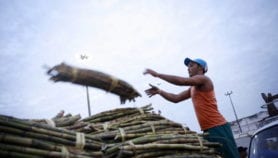By: K. S. Jayaraman
Send to a friend
The details you provide on this page will not be used to send unsolicited email, and will not be sold to a 3rd party. See privacy policy.
[NEW DELHI] After three years of heated debate, the Indian government today (26 March) approved the first genetically modified (GM) crop for cultivation by its farmers.
Such approval will be subject to “certain conditions”, the precise nature of which will not officially be made public until tomorrow. However even with such conditions, the decision is likely to have a major impact across the developing world, where the safety and environmental impact of such crops remains the subject of intense controversy.
The Genetic Engineering Approval Committee (GEAC) gave permission to Mumbai-based Maharashtra Hybrid Company (MAHYCO) for the commercial production and sale of cotton seeds carrying the Bt (Bacillus thuringiensis) gene that offers protection against bollworm, the most serious cotton pest in India.
GEAC member Prasantha Kumar Ghosh said that the permission was being given on condition that farmers will grow five rows of non-Bt cotton in 20 per cent of the field. “We put this condition to ensure that bollworms do not develop resistance to Bt toxin,” he explained.
The Indian company purchased the Bt gene from the US life sciences company Monsanto six years ago and introduced it in native cotton varieties.
MAHYCO had been field-testing their pest resistant hybrids for the last three years in 40 locations under the supervision of the government departments of biotechnology and agriculture.
The GEAC, which examined the data from field trials, cleared three of the four Bt cotton hybrids developed by MAHYCO, which has enough seeds to bring 150,000 hectares of land under Bt cotton in India this year. Monsanto, which has a 27 per cent share in MAHYCO, is likely to be a significant beneficiary of today’s GEAC decision.
Official approval for Bt cotton could be a major setback for the anti-GM campaigns that have been conducted by leading Indian environmental and food security activists. “We want neutral, transparent, critical evaluation of a new, controversial technology,” says Suman Sahai of Delhi-based Gene Campaign, a non-governmental organisation. Instead, the corporate sector seems to be deciding the policy, she charged.
Indian farms are on average less than a hectare in size, and Sahai argues that it is impossible to regulate pollen dispersal and thus ensure a farmer’s right not to grow GM crops.
But Indian science minister Murli Manohar Joshi said that Bt cotton had been cleared after extensive trials. “Our scientists have found it safe in all aspects. I go by their findings”.
Photo credit: Robert Bradnock













